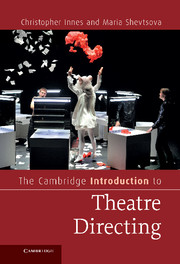Book contents
- Frontmatter
- Contents
- List of illustrations
- Acknowledgements
- Introduction
- Chapter 1 Traditional staging and the evolution of the director
- Chapter 2 The rise of the modern director
- Chapter 3 Directors of theatricality
- Chapter 4 Epic theatre directors
- Chapter 5 Total theatre: the director as auteur
- Chapter 6 Directors of ensemble theatre
- Chapter 7 Directors, collaboration and improvisation
- Notes
- Select bibliography
- Index
- References
Chapter 3 - Directors of theatricality
Published online by Cambridge University Press: 05 April 2013
- Frontmatter
- Contents
- List of illustrations
- Acknowledgements
- Introduction
- Chapter 1 Traditional staging and the evolution of the director
- Chapter 2 The rise of the modern director
- Chapter 3 Directors of theatricality
- Chapter 4 Epic theatre directors
- Chapter 5 Total theatre: the director as auteur
- Chapter 6 Directors of ensemble theatre
- Chapter 7 Directors, collaboration and improvisation
- Notes
- Select bibliography
- Index
- References
Summary
Vsevolod Meyerhold: commedia dell’arte to biomechanics
Meyerhold was one of the most daring experimenters of the twentieth century, exploring a breathtaking variety of ways of making theatre, and it is with him that the directorial line of theatricality begins. Like Stanislavsky, he was an actor, who had considerable success playing Konstantin Treplev in Stanislavsky’s The Seagull, and performing in the provinces as well as in St Petersburg at the theatre of the renowned actress Vera Komissarzhevskaya. Despite his acclaim as an actor, he concentrated his efforts on directing, including productions at the Mariinsky Opera. His last stage performances were during the 1916–17 season of the Aleksandrinsky Theatre, an august establishment which, like the Mariinsky, was part of the group of imperial theatres of St Petersburg. However, he continued to act by proxy in so far as, in rehearsals, he ‘demonstrated, demonstrated, demonstrated’ to the actors. His improvisation skills and capacity for ‘instantaneous inspiration’ made him an outstanding actor-demonstrator – a role of fundamental importance to his work as a director throughout his life. Meyerhold, unlike Stanislavsky, saw himself as a director, first and foremost.
Meyerhold was the stage director of the Aleksandrinsky from 1908 to 1917. His was an unlikely appointment given the theatre’s strong links with the aristocratic elite, although, in fact, its liberal managing director had brought him in to breathe new life into this Tsarist institution. It was during his Aleksandrinsky period that, under the alias of Doctor Dapertutto, Meyerhold started the theatre-studios where he trained actors, a practice he was to continue after his return to Moscow. Many of his students were to become brilliant performers in his companies; and this actor training was also fundamental to his work as a director, since it provided him and his team with a common artistic understanding.
- Type
- Chapter
- Information
- The Cambridge Introduction to Theatre Directing , pp. 77 - 115Publisher: Cambridge University PressPrint publication year: 2013

